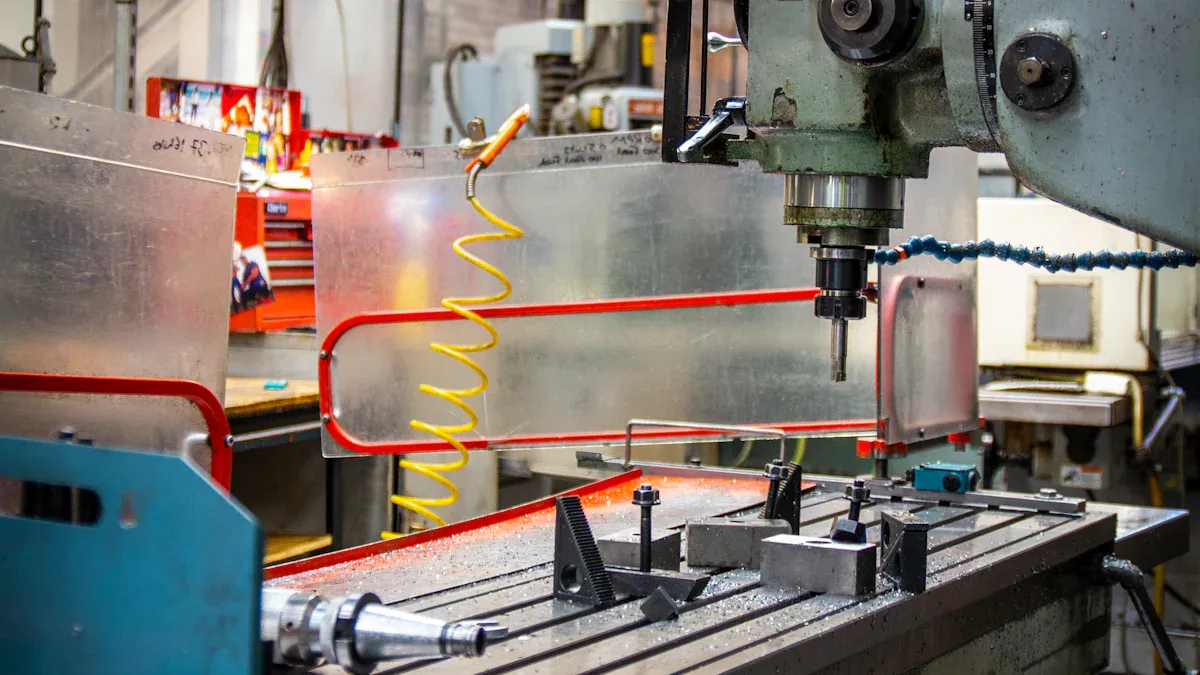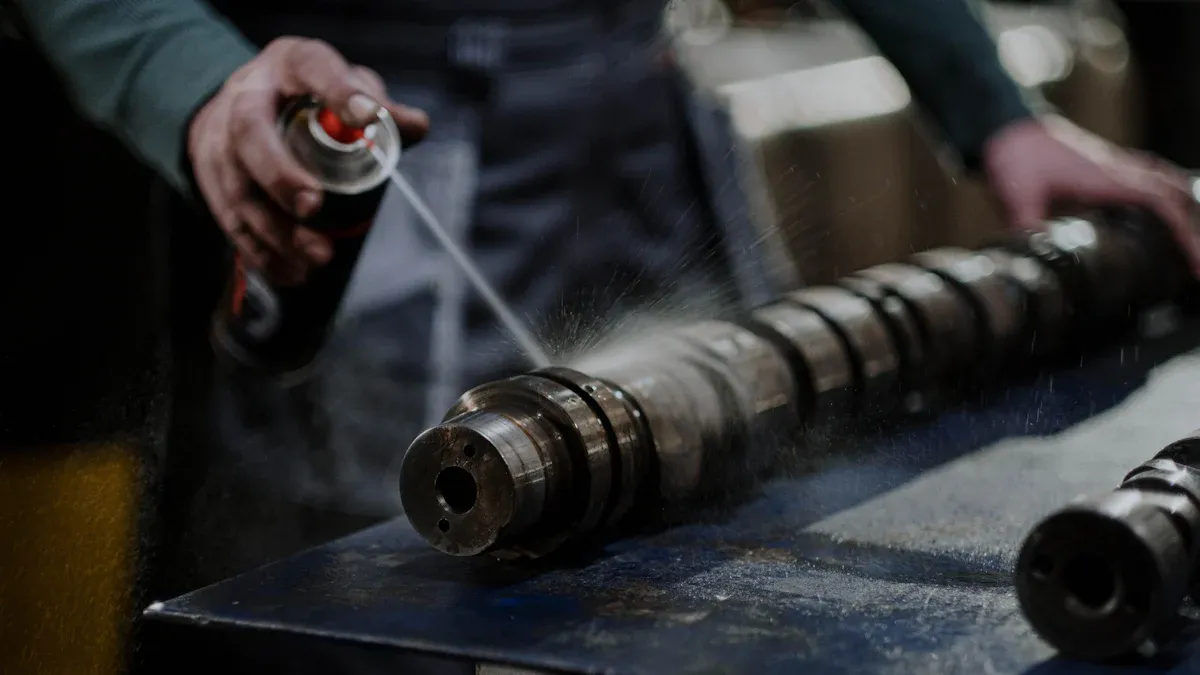
Balancing performance and budget in tin bronze casting ensures quality without overspending. Strategic planning plays a key role here. For instance, Ningbo Pingheng Machinery Co., Ltd., established in 1999, uses silica sol precision casting and lost wax investment casting to deliver cost-effective tin bronze precision casting solutions for industries like automotive and engineering.
Key Factors in Cost-Effective Tin Bronze CastingMaterial Selection and Alloy Composition
Choosing the right material is the foundation of cost-effective tin bronze casting. Each alloy composition offers unique properties that suit specific applications. For example, MTEK 65 (C90700) contains 89% copper and 11% tin, making it ideal for gears and bearings. On the other hand, MTEK C90500, with 2% zinc, performs well under heavy loads. Here’s a quick comparison of common alloys:
| Alloy Composition | Copper (%) | Tin (%) | Other Elements | Applications |
|---|---|---|---|---|
| MTEK 65 / C90700 | 89 | 11 | N/A | Gears, bearings, bushings |
| MTEK C90500 | 87 | 10 | 2% Zinc | Heavy load applications |
| MTEK C92300 | 87 | 8 | 4% Zinc, 1% Lead | Valve guides, bearings |
| MTEK C92501 | 87 | 11 | 1% Nickel, 1% Lead | Piston pin bushings |
| MTEK C92700 | 87 | 10 | 2% Lead, 1% Nickel | Steam fittings, seal rings |
Factors like cost, mechanical properties, and corrosion resistance play a big role in material selection. For instance, while bronze resists corrosion and lasts longer, its initial cost may be higher. Ningbo Pingheng Machinery Co., Ltd., established in 1999, uses investment casting to work with tin bronze and other alloys, ensuring materials meet industry-specific standards.
Process Efficiency and Workflow Optimization
Streamlining the casting process can significantly reduce costs. Efficient workflows minimize waste and improve throughput. Companies can achieve this by refining mold designs, eliminating overflows, and simplifying handling. For example, proactive maintenance prevents equipment failures, while evaluating workflows helps identify inefficiencies. Ningbo Pingheng Machinery Co., Ltd. optimizes its investment casting process to deliver precision parts for industries like automotive and engineering.
Here are some best practices for improving efficiency:
- Focus on mold design to enhance precision.
- Simplify casting processes, such as considering cold casting methods.
- Train workers to reduce processing errors and costs.
Waste Reduction and Scrap Management
Reducing waste is another critical factor in cost-effective tin bronze casting. By recycling scrap materials, companies can lower raw material costs. For instance, reusing leftover bronze from previous casts not only saves money but also reduces environmental impact. Proper scrap management also ensures that high-quality materials are used in every batch, maintaining product integrity.
Ningbo Pingheng Machinery Co., Ltd. emphasizes waste reduction by adopting precision casting techniques. This approach minimizes material loss and ensures consistent quality, making it a reliable partner for industries like shipbuilding and power generation.
Strategies to Enhance Operational EfficiencyOptimizing Mold Design for Precision
Mold design plays a critical role in improving operational efficiency. A well-optimized mold reduces production cycles and minimizes waste caused by defects or errors. This approach not only saves time but also cuts costs by lowering scrap rates. Manufacturers who focus on precision in mold design can achieve consistent results, which is essential for high-quality tin bronze casting. Ningbo Pingheng Machinery Co., Ltd., established in 1999, uses investment casting with medium-temperature wax to ensure precision. Their expertise in casting materials like tin bronze and silicon brass allows them to meet the diverse needs of industries such as automotive and engineering.
Minimizing Overflows and Material Loss
Reducing overflows and material loss is another way to enhance efficiency. Overflows often lead to wasted resources and additional cleanup efforts. By refining casting techniques and using precise measurements, manufacturers can prevent unnecessary material loss. Ningbo Pingheng Machinery Co., Ltd. adopts precision casting processes to minimize waste while maintaining high standards. This approach ensures that industries like shipbuilding and power generation receive reliable and cost-effective solutions.
Improving Handling and Surface Treatments
Efficient handling and surface treatments can significantly improve the overall casting process. Best practices include:
- Eliminate part lines and marks through polishing or other surface treatments.
- Optimize processes like degassing, deburring, and sandblasting for better results.
- Adjust container dimensions and component positioning to streamline handling.
These steps not only enhance the final product’s quality but also reduce production time. Ningbo Pingheng Machinery Co., Ltd. excels in providing high-quality precision casting solutions by focusing on these details. Their expertise ensures that industries receive durable and well-finished components.
Cost-Saving Measures in Tin Bronze CastingEnergy-Efficient Practices
Energy-efficient practices can significantly reduce costs in tin bronze casting while promoting sustainability. Manufacturers often optimize operations to increase throughput and eliminate overflows during the casting process. For instance, refining mold designs and simplifying production cycles help save time and money. Proactive equipment maintenance also prevents breakdowns, avoiding costly delays.
Energy efficiency contributes to environmental benefits as well. Using recycled copper and tin reduces the need for mining, which lowers energy consumption. Additionally, bronze bushings, known for their long lifespan and low friction, save energy in machinery operations. Companies adopting these practices have reported reduced greenhouse gas emissions and energy costs.
Ningbo Pingheng Machinery Co., Ltd., established in 1999, adopts investment casting with medium-temperature wax to ensure precision. Their expertise in tin bronze and other copper alloys allows them to deliver energy-efficient solutions for industries like automotive and power generation.
Recycling and Reusing Materials
Recycling and reusing materials play a crucial role in cost-saving strategies. Leftover bronze from previous casts can be melted down and reused, reducing raw material expenses. This approach not only saves money but also minimizes waste. Companies that prioritize recycling maintain high-quality standards while lowering their environmental impact.
Ningbo Pingheng Machinery Co., Ltd. emphasizes recycling in its precision casting process. By reusing materials like tin bronze and silicon brass, they provide sustainable solutions for industries such as shipbuilding and engineering machinery.
Negotiating Supplier Contracts
Negotiating supplier contracts is another effective way to cut costs. Foundries often offer discounts for bulk orders or long-term collaborations. Comparing quotes from multiple suppliers helps manufacturers find the best fit for their budget. Building strong relationships with suppliers can also lead to flexible payment plans and additional savings.
Ningbo Pingheng Machinery Co., Ltd. works closely with its clients to provide cost-effective solutions. Their commitment to quality and affordability makes them a trusted partner for industries requiring precision casting.
Leveraging Technology for Cost-Effective Tin Bronze Casting

Automation for Consistency and Speed
Automation has transformed the way manufacturers approach tin bronze casting. By automating repetitive tasks, companies can achieve consistent results and faster production cycles. Robots and automated systems handle tasks like pouring molten metal, reducing human error and improving precision. This not only saves time but also ensures uniformity in every cast.
Ningbo Pingheng Machinery Co., Ltd., established in 1999, uses investment casting with medium-temperature wax to deliver precise results. Their automated processes allow them to meet the high standards required by industries like automotive and power generation. Automation also helps them work efficiently with materials like tin bronze, silicon brass, and stainless steel.
Simulation Software to Reduce Errors
Simulation software is a game-changer for reducing errors in the casting process. It allows manufacturers to test and refine designs before production begins. By simulating the flow of molten metal, engineers can identify potential issues like air pockets or uneven cooling. This proactive approach minimizes defects and saves resources.
Ningbo Pingheng Machinery Co., Ltd. leverages advanced simulation tools to perfect their precision casting process. This ensures that components for industries such as shipbuilding and engineering machinery meet exact specifications. Simulation software also helps them optimize their use of materials, including tin bronze, to reduce waste.
Data Monitoring for Continuous Improvement
Data monitoring plays a crucial role in improving efficiency over time. By collecting and analyzing data from each production cycle, manufacturers can identify trends and areas for improvement. For example, tracking temperature fluctuations or mold performance can help refine processes and reduce costs.
Ningbo Pingheng Machinery Co., Ltd. integrates data monitoring into their operations to maintain high-quality standards. This approach allows them to adapt quickly to changing requirements and deliver reliable solutions. Their focus on continuous improvement ensures that industries receive durable and cost-effective components.
Balancing performance and budget is vital for successful tin bronze casting projects. It ensures quality while keeping costs under control. Key strategies include:
- Partnering with foundries for discounts.
- Streamlining production processes.
- Proactively maintaining equipment to avoid breakdowns.
A strategic approach, like financial planning and proactive resource allocation, ensures long-term success. Ningbo Pingheng Machinery Co., Ltd., established in 1999, exemplifies this by using investment casting with medium-temperature wax to deliver precision solutions for industries like power generation and shipbuilding.
Tip: Combining cost-saving measures with advanced techniques, like precision casting, can maximize efficiency and minimize waste.
FAQ
What makes tin bronze casting cost-effective?
Tin bronze casting becomes cost-effective by optimizing processes, recycling materials, and using energy-efficient practices. Ningbo Pingheng Machinery Co., Ltd. excels in delivering precision solutions through investment casting.
Can Ningbo Pingheng Machinery Co., Ltd. cast different materials?
Yes! They cast tin bronze, silicon brass, and stainless steel (304, 316) using investment casting. Materials meet various national standards for industries like power, automotive, and shipbuilding.
How does precision casting improve quality?
Precision casting ensures accurate dimensions and smooth finishes. Ningbo Pingheng Machinery Co., Ltd. uses medium-temperature wax to achieve high-quality results for industries like engineering machinery and electric power.
Media Contact
Company Name: Ningbo Pingheng Machinery Co., Ltd.
Email: Send Email
Address:Factory Building 1, No. 19, Xianxiang Road, Xiangshan County
City: Ningbo
State: Zhejiang Province
Country: China
Website: https://www.thecastingfactory.com/
